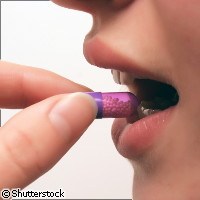Food supplements under the EU microscope
People across Europe consume food supplements for a variety of reasons: to ensure that they are getting enough nutrients or to rectify a nutritional deficiency that impacts their well-being, for example. But how safe are they? The European Food Safety Authority (EFSA) has completed a comprehensive assessment on substances used as sources of vitamins and minerals for food supplements that are found on European shelves. Food supplements, also known as dietary supplements, may be found in various forms such as tablets, liquids and powders. Their ingredients might include herbs, amino acids, or metabolites and enzymes that have a nutritional or physiological effect on the human body. One substance assessed by the EFSA was chromium nitrate, which is used as a source of chromium in food supplements. Chromium, a trace mineral, is believed by many scientists to help the body 'burn' carbohydrates and fat. It also provides blood sugar to cells and may boost sensitivity to insulin, possibly helping curb people's cravings for carbohydrates and sweets. But problems may emerge with the unregulated consumption of such substances. Consuming too many vitamins and minerals could trigger side effects, the EFSA says. The safe use of vitamins and minerals in food supplements is possible, but maximum levels must be determined. Over a 4-year period, the EFSA assessed 533 applications relating to 344 different substances. Their report explained that the assessments were based on scientific evidence provided by food-supplement manufacturers to establish how safe these nutrient sources are, as well as to determine their bioavailability (how chemicals are absorbed by the human body). A total of 186 applications were withdrawn during the evaluation process. The EFSA also noted that due to insufficient scientific evidence, it was not possible to assess around 50% of the remaining applications. The authority identified potential safety concerns in 39 applications in its assessment. 'Millions of people across Europe regularly take food supplements in addition to their normal diet,' explained John-Christian Larsen, the Chair of EFSA's Panel on additives and nutrient sources added to food (the ANS Panel). 'The work of the Panel will help to ensure that the sources of vitamins and minerals used in food supplements which are sold in the EU are safe and can effectively provide these nutrients to the body. 'Completing this huge task in line with the challenging deadline agreed with the European Commission is an important milestone in EFSA's work in the area of consumer protection, and represents a significant achievement for the ANS Panel in particular,' he said. The EFSA also pointed out that only nutrient sources whose safety and bioavailability it has assessed and are listed in the relevant Annex of the EU Directive 2002/46/EC can continue to be used in food supplements. This rule is effective from 1 January 2010. The nutrients include vitamins A, D, K, folic acid, zinc, selenium, chromium and manganese, as well as the minerals calcium carbonate, ferrous sulphate (iron) and sodium hydroxide. The Directive targets the harmonisation of the legislation for food supplement labelling and the guarantee that the products are safe and appropriately labelled so that European consumers can make informed choices.



